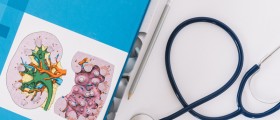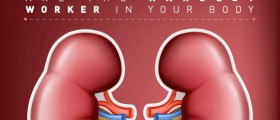
Definition of Polycystic kidney disease
Polycystic kidney disease is a medical condition characterized by formation of cysts that affect normal appearance of the kidney and may even interfere with the function of the organ, especially if there are multiple cysts. The condition is inherited. There are usually many cysts affecting one or both kidneys. It is essential to mention that cysts in this disease may additionally form on other organs including the liver, pancreas, spleen or ovary. Furthermore, such patients are also prone to cysts in the wall of the large intestine, brain aneurysms and abdominal hernias.
Polycystic kidney disease can be classified into several types. In the majority of cases the disease is considered as 'adult polycystic kidney disease' while there are also less common types such as polycystic kidney disease in babies or children.
The very presence of cyst in the kidneys is asymptomatic or associated with a variety of symptoms and signs. Some patients may complain about pain in the flank area, particularly if some of the cysts get inflamed. Furthermore, the cysts may easily get infected. They are additionally blamed for blood in the urine, recurrent kidney infections and are commonly associated with the onset of high blood pressure. Many times the condition is either diagnosed accidentally when an individual undergoes certain exams such as ultrasound of the abdomen for other purposes or once the symptoms start to occur. Still, not all the patients will experience all the mentioned medical issues.
Polycystic kidney disease is always passed from a parent to his/her child in an autosomal dominant fashion. Because of that only one copy of the defective gene is sufficient enough for the child to develop the disease. If one parent is suffering from polycystic kidney disease, the chances that his/her child will develop the condition himself/herself is 50-50. Boys and girls are at equal risk.
Finally, there is a rare form of the disease inherited in an autosomal recessive fashion. In such case both parents must be carriers of the defective gene for the child to develop the condition.
Diagnosing Polycystic Kidney Disease
People whose kidneys are cystically changed basically experience no symptoms until they are 30 or even 40 years old. In the majority of cases high blood pressure, abdominal distension, blood in the urine and frequent/recurrent kidney infections are medical issues that drive people to see their health care providers.
High blood pressure is a serious consequence of polycystic kidney disease. It may damage each and every blood vessel in the body and trigger various complications, some of which are heart attack, stroke, etc.
Exams and test these patients undergo usually show the presence of hypertension, palpable kidney or abdominal masses along with abdominal tenderness. The liver may be tender and enlarged as well. Heart auscultation generally confirms heart murmurs which develop due to aortic or mitral insufficiency. Urinanalysis confirms the presence of blood and proteins in the urine. If blood loss is severe, one has low levels of hemoglobin or hematocrit.
Abdominal ultrasound, CT scan or MRI are very helpful when it comes to visualizing the cysts and confirming the condition. Intravenous pyelogram (IVP) is another radiological procedure performed in case of this anatomical abnormality.
Additional tests include cerebral angiography (conformation of associated aneurysms) and genetic tests. Genetic test can reveal carriers of the defective gene.
Treatment Options
Unfortunately, as it is the case with any other genetic disorder, there is no cure for polycystic kidney disease. Patients who are asymptomatic require no treatment. However, those with symptoms and especially patients with already developed complications are treated symptomatically.
The goal of symptomatic therapy is to bring hypertension under control, eradicate any bladder of kidney infection and prevent its recurrence and prevent further complications. Such patients are due to stick to special dietary regime, engage in physical activity, quit with all the nasty habits such as smoking or drinking and keep their weight under control. Salt intake is highly limited.
Relevant Data
It is estimated that polycystic kidney disease is actually the most common inherited disease affecting more than 600,000 people in the United States. What is more, 50% of all patients eventually develop kidney failure. This complication generally occurs by the age of 60. This means that a half of people will require dialysis or kidney transplant once their kidneys stop working completely. If the condition occurs in childhood, the prognosis is even worse. Namely, children may develop kidney failure earlier in their lives. The risk of kidney failure is higher in men, patients with hypertension, those with proteins in their urine as well as women suffering from hypertension who have had more than three pregnancies.
Hypertension, a common complication of polycystic kidney disease, affects approximately 60% of all patients.
Finally, polycystic kidney disease may also be blamed for a floppy heart valve. As a matter of fact around 25% of patient develop this heart complication and require additional treatment.












-Symptoms,-Diagnosis,-Treatment_f_280x120.jpg)




Your thoughts on this
Loading...